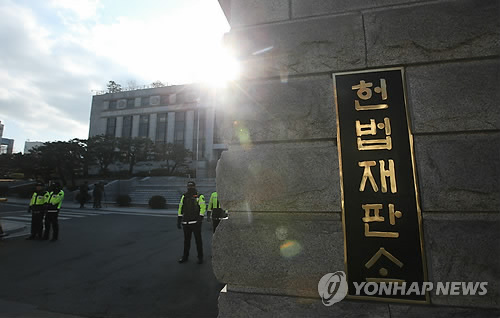South Korea’s Constitutional Court on Thursday ruled constitutional an election law that requires its citizens to use their real names when posting political comments on Internet forums during campaign periods.
The court ruled in favor of the law, saying the rule was necessary to prevent “distortion of information” and ensure “fairness” in elections.
Of the panel of nine judges, five voted in favor of the law, while four deemed it as unconstitutional.
 |
(Yonhap) |
Under the current Public Official Election Act, news websites have been required to authenticate Internet users’ identity before enabling them to post comments and videos either advocating or opposing certain candidates and parties on their forums during an election campaign.
Those violating the law face a fine of up to 10 million won ($8,600).
The court said in the verdict that false rumors and propaganda on news websites can rapidly and widely hamper fairness of elections, given the credibility of media outlets.
It also added that the law does not violate press freedom or people’s right to express political opinions, considering that writers’ personal information remain withheld after news sites check their identities.
But four judges against the regulation said the public’s right to free speech should be guaranteed at most especially during election campaigns to promote “fairness” of elections.
They argued that the real-name verification rule is in place for the sake of the authorities to more efficiently investigate election-related crimes, treating citizens as “potential criminals.”
With the ruling, Internet users will still be required to verify their identities with their names and resident registration numbers to make political remarks on news websites during campaigning periods.
Rep. Yoo Seung-hee, a head of the free speech committee in the opposition New Politics Alliance for Democracy, called the court’s decision as “retreat in liberal democracy.”
“The real-name verification law has been politically abused to discriminate against opposition party candidates and their supporters,” he said in a statement right after the ruling.
South Korea ranks 60th among 180 countries in the press freedom index by Reporters Without Borders. Another global indicator by media watchdog Freedom House rated Korea as “partly free” to free speech.
The real-name verification law, introduced in 2007, was applied to websites with more than 100,000 visitors a day.
The court ruled the so-called “Internet real-name system” stipulated in the information and communications network law unconstitutional in 2012, saying that the system had undermined freedom of speech.
Under the elections law, however, the regulation remained intact for campaign periods.
Following the 2012 ruling, the government came under growing pressure to change the law to uphold the Constitutional Court’s decision, with the National Election Commission asking the National Assembly to amend the relevant laws.
Later in the year, Rep. Jin Sun-mi of the main opposition New Politics Alliance for Democracy presented a revised election law, but the amendment has not yet been made.
Daum Communications, then the nation’s second-biggest search engine, which provided news on its website, filed a constitutional appeal in 2013 after the authorities imposed a financial penalty on the firm for allowing netizens to make political comments without checking their identification.
By Ock Hyun-ju (
laeticia.ock@heraldcorp.com)








![[Today’s K-pop] Blackpink’s Jennie, Lisa invited to Coachella as solo acts](http://res.heraldm.com/phpwas/restmb_idxmake.php?idx=644&simg=/content/image/2024/11/21/20241121050099_0.jpg)